
Gonialoe variegata, also known as tiger aloe and partridge-breasted aloe, is a species of flowering plant in the family Asphodelaceae. It is an evergreen succulent perennial indigenous to South Africa and Namibia. It is common in cultivation.

Gasteria is a genus of succulent plants, native to South Africa and the far south-west corner of Namibia.

The angulate tortoise is a species of tortoise found in dry areas and coastal scrub vegetation in South Africa. This tortoise is the only known member of the genus Chersina.
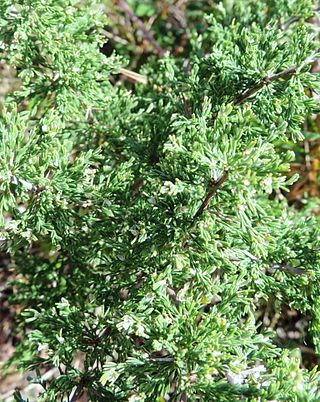
Asparagus capensis, also called katdoring is a dense, thorny, shrub of the Asparagus genus, that is indigenous to South Africa and Namibia.

Astroloba spiralis is a small succulent plant of the Astroloba genus, endemic to the southern Karoo regions of the Western and Eastern Cape Provinces, South Africa.
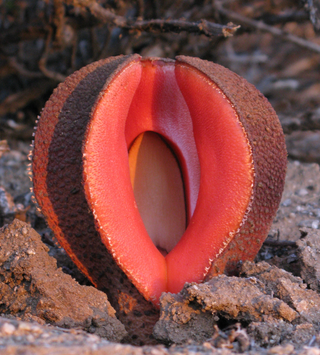
Hydnora visseri, the Visser's hydnora, is a subterranean holoparasitic plant, lacking leaves and roots, and is described from southwestern Namibia and northwestern South Africa and has the longest tepal lobes of all Hydnora species. The genus Hydnora is composed entirely of holoparasitic plants that attach to the root of their hosts and are restricted to Africa and southwestern Asia.

The Whitehill Formation, alternatively written as White Hill Formation and formerly known as White Band or Whitehill or White Hill Member, is a regional Early Permian geologic formation belonging to the Ecca Group in the southeastern ǁKaras Region of southeastern Namibia and Eastern, Northern and Western Cape provinces of South Africa.
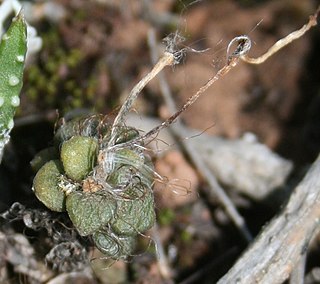
Anacampseros retusa is a species of succulent plant native to the Northern Cape and Western Cape Provinces of South Africa, as well as to Namibia.

Crassula subaphylla is a succulent plant belonging to the family Crassulaceae. It is widespread in the Karoo regions of South Africa and Namibia.
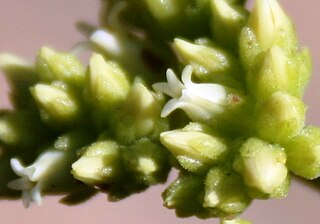
Crassula atropurpurea is a succulent plant, very common and widespread in the southern Karoo regions of South Africa and Namibia.

Gazania lichtensteinii is a species of flowering plant in the family Asteraceae, native to South Africa and Namibia. On the SANBI Red List, it is listed as "safe".

Cyanella lutea is a species of cormous herb, native to South Africa and southern Namibia, where it grows in clay-rich or loamy soils.
Asparagus burchellii, is a shrub of the Asparagus genus, that is indigenous to dry scrub vegetion in the southern Cape region, South Africa.

Euphorbia tuberosa, commonly known as '"milkball/melkbol"' or '"wilderamenas"', is a variable geophytic plant of the family Euphorbiaceae, indigenous to the western parts of South Africa.

Drimia capensis ("Maerman") is a species of geophytic flowering plant in the family Asparagaceae, subfamily Scilloideae, indigenous to the south-western parts of South Africa.
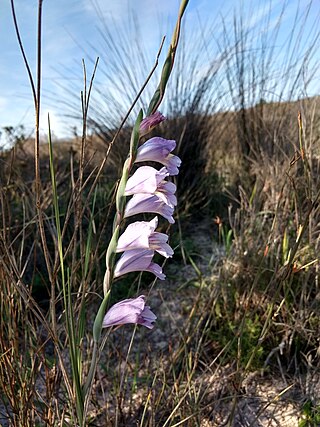
Gladiolus patersoniae is a herbaceous perennial plant belonging to the genus Gladiolus of the family Iridaceae, indigenous to the southern Cape regions of South Africa.
Kedrostis africana is a species of flowering plant in the family Cucurbitaceae. It is native to Namibia and South Africa.

Ornithoglossum undulatum, also known as the Karoo Slangkop, is a species of flowering plant in the family Colchicaceae. It is found in Southern Namibia and South Africa. In South Africa its range extends as far east as Somerset East in Eastern Cape Province. O. undulatum is a poisonous plant, and consumption of the leaves can kill livestock.
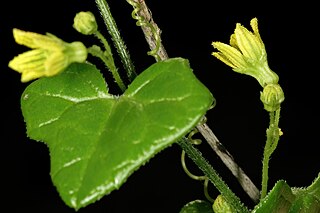
Kedrostis nana is a species of flowering plant in the family Cucurbitaceae, indigenous to scrub vegetation in the coastal areas of South Africa, from Saldanha in the west, along the coast as far east as KwaZulu-Natal.

















